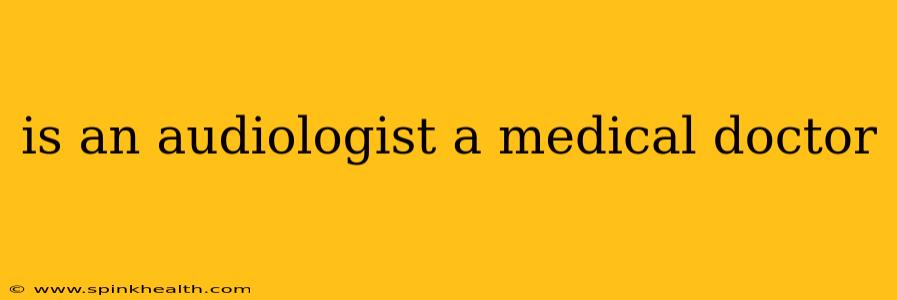Is an Audiologist a Medical Doctor? Unraveling the Mysteries of Hearing Healthcare
The short answer is no, an audiologist is not a medical doctor (MD) or doctor of osteopathic medicine (DO). But that doesn't diminish their crucial role in healthcare. Let's delve deeper into the fascinating world of audiology and clarify the distinctions between audiologists and medical doctors specializing in ear, nose, and throat (ENT) care.
My journey into understanding this distinction began with a personal experience. A persistent ringing in my ears (tinnitus) led me to seek professional help. The initial appointment was with my family physician, who, after a quick examination, referred me to an audiologist. This referral sparked my curiosity about the differences between these two healthcare professionals.
The audiologist, unlike a doctor, doesn't have the authority to prescribe medication or perform surgery. Instead, they are highly trained healthcare professionals specializing in the diagnosis, treatment, and management of hearing and balance disorders. Their expertise lies in identifying the root causes of hearing loss, recommending appropriate hearing aids, and providing rehabilitative therapy to help individuals cope with their hearing challenges.
Think of it like this: a doctor is a general practitioner or specialist who can diagnose and treat a wide range of medical conditions, including those affecting the ears. An audiologist, however, focuses exclusively on the intricate workings of the auditory and vestibular systems (responsible for hearing and balance). They are the experts when it comes to the complexities of sound, hearing, and balance disorders.
What Does an Audiologist Do?
Audiologists perform a range of essential services, including:
- Hearing tests: They conduct comprehensive hearing evaluations to identify the type and degree of hearing loss.
- Hearing aid fitting and dispensing: They fit and adjust hearing aids to optimize hearing function.
- Hearing rehabilitation: They provide therapy and counseling to help individuals cope with hearing loss and its impact on their lives.
- Balance testing: They assess balance disorders and recommend appropriate treatment options.
- Tinnitus management: They develop strategies to manage the symptoms of tinnitus.
- Hearing protection: They educate patients about the importance of hearing protection and provide custom-made hearing protection devices.
What's the Difference Between an Audiologist and an ENT Doctor?
This is a crucial distinction! While both professions work with hearing and ear-related issues, their approaches and expertise differ significantly.
- ENT doctors (otolaryngologists): These are medical doctors specializing in the surgical and medical treatment of ear, nose, and throat conditions. They can diagnose and treat infections, perform surgeries, and prescribe medications.
- Audiologists: Focus on non-medical aspects of hearing health, providing diagnostic testing, hearing aid fitting, and rehabilitation services. They collaborate closely with ENT doctors when medical intervention is needed.
How Can I Find a Qualified Audiologist?
Locating a qualified and licensed audiologist is critical. Several resources can help you in your search:
- Your family doctor: Your physician can often provide referrals to qualified audiologists in your area.
- Online directories: Several online directories list licensed audiologists, often with patient reviews.
- Professional organizations: Check the websites of professional organizations like the American Academy of Audiology (AAA).
Does an Audiologist Need a Medical Degree?
No, audiologists do not need a medical degree. They typically hold a Doctor of Audiology (AuD) degree, which is a professional doctorate requiring extensive academic training and clinical experience. This rigorous education prepares them to address the diverse needs of individuals with hearing and balance disorders.
What Kind of Education Does an Audiologist Have?
The educational path for an audiologist is quite rigorous, encompassing years of dedicated study. This includes extensive coursework in acoustics, anatomy, physiology, and audiological practices, culminating in clinical internships and supervised practice.
In conclusion, while an audiologist and an ENT doctor both play vital roles in ear and hearing health, their expertise and responsibilities are distinct. An audiologist is not a medical doctor but a highly trained specialist focused on the non-medical aspects of hearing and balance. Understanding these distinctions is crucial for effective healthcare and receiving the appropriate care for your hearing and balance needs.

